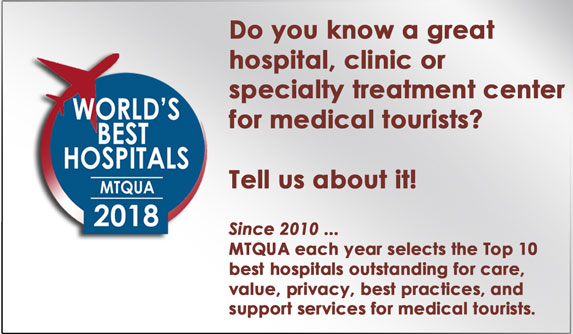 (Part 1) Are medical tourism commission payments ethical?
(Part 1) Are medical tourism commission payments ethical?
At the Medical Travel Quality Alliance, we get many emails asking about business models for medical tourism agencies.
There are several business models for a medical tourism company or facilitator seen around the world, from enhanced travel agent at one end to an inclusive care management service at the other. In this first part, we review aspects of the enhanced travel agent, often called a medical tourism facilitator, business model.
What is the best business model for a medical tourism company?
The choice made for the kind of business to operate will likely determine how and for how much providers should pay agencies for bringing them patients.
How much should providers pay an agent for a patient?
When accepting patients from a medical travel agency, one of the first questions asked is how much should hospitals, doctors or clinics pay an agent for a referral?
The answer is usually payment to the agent of some form of commission per patient.
However, there is another, more fundamental question to ask first – by both providers and medical tourism agencies – before choosing a commission-type payment.
Is paying commission to a medical tourism facilitator ethical?
Is it ethical for a medical tourism company to take commissions from providers?
One of the more popular business models for an international medical travel business is a company that is travel-focused and provides ground services for its customers. Like a destination agent in the tourism industry, this company offers standard ground handling services, and includes health-related services such as transportation to and from hospital or clinic appointments.
If a medical tourism agency like this declares to its customers that it gets a commission for bringing in business, and if its activity is limited to providing these destination services for its customers, few would question the ethics of getting paid by commission.
Is the medical tourism facilitator in the travel business or is it in health care?
A variant of this kind of company is one that provides these services plus a limited number of medically-related activities like transferring medical records between patient and doctor or furnishing doctor qualifications to a patient. When including these medically-related services, the company often calls itself a medical travel facilitator.
It is common for providers to pay these facilitators a commission for each patient brought in. They often reward them with incentives, bonuses or deeper discounts for greater volumes of patients.
Some of these companies even advertise “no fees” to patients as a desirable feature, and they rarely admit to the commissions they earn from the providers.
Is a facilitation company like this in the travel business or is it in health care? If it is in the travel business, it perhaps should consider declaring to its customers that it gets a commission from every provider. Transparency is desirable for facilitators as well as hospitals.
Sales commission is a reward
A commission is a tool to encourage and incentivize sales people to sell more. Nothing is wrong with accepting a commission, if you are a sales company (like a travel agency) and earn this commission for completion of a sale.
A commission may also be a fee charged by a broker or agent for facilitating a sale of securities or real estate. These commissions are generally fixed by law or set by customary practice. The amount or rate is transparent and publicly acknowledged in the documentation of the transaction.
Buying and selling patients
When a medical tourism facilitator is paid on commission, it suggests the relationship between the agent and the providing hospital or doctor is more sales-based than service-based. It is payment on delivery of a warm body to the doorstep. Nothing more, nothing less. The agent, in order to attract the warm bodies, offers airport pickup, transportation to the hospital, touring, and other destination-type services as incentives for the customer to book with the company.
Ethical or not?
The danger, as some point out, is that these agents or facilitators, in order to increase their commissions, may suggest their customers go where the payout is the greatest. To them, a good medical outcome is a low priority and has little impact on their business.
Furthermore, these customers may assume the medical travel company or facilitator is a licensed travel agency. They may believe the money they pay to the agency for the cost of treatment is safely held in an escrow account until needed, just as bonded agencies that sell airline tickets do. More than one medical tourist has been surprised and shocked – shocked! – to find out that a medical tourism agency has absconded with their money.
The line between travel agency and medical travel agency becomes even more confusing for the customer because some of these medical travel companies offer to arrange airline tickets for their customers.
Medical tourism ethics and conflict of interest
If this agency considers itself to be a health care rather than a travel agency, many would argue it is acting unethically by taking commissions. Yet most providers have readily chosen commissions as their preferred method of payment to such an agency.
In health care in most parts of the world, payment of commissions to attract referrals (or admissions) of patients is considered unethical and unacceptable. Such payments generally indicate a conflict of interest that may negatively affect patient care, since patients may not necessarily be referred to the most appropriate doctor or hospital for treatment. They may instead be referred to the doctors or hospitals from whom the agent collects a higher commission.
As a facilitator, do you consider yourself in the tourism industry or in health care? What is your payment or reimbursement model?
Providers, how do you pay agents? Or do you?
Next: Are medical travel agencies practicing medicine without a license?

 >
>
5 Responses to Medical Travel Agency Business Models